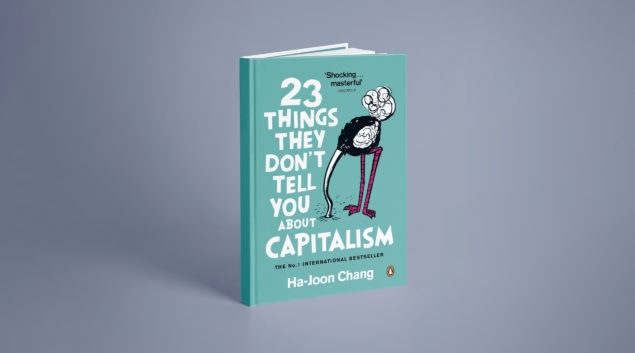
As part of our Nordic Sustainability book club, The Overbooked Consultants Club, our plan is to read everything from social justice, economics, and climate change to corporate culture, change management, and self-help books. And probably a lot in between.
Our reviews of the books are going to be just as inconsistent as our book club, because although we love reading – happy clients come first. We’d love to hear what you think about the works we’re reading and we always accept suggestions, so we encourage you to join the chat on LinkedIn here. Today, we are going to talk about “23 things they don’t tell you about capitalism” by Ha-Joon Chang. In this book, Ha-Joon Chang, a Cambridge economist and former World Bank consultant, calls BS on free-market capitalism and looks at how the system can be changed for the better.“Economics, as it has been practised for the last three decades, has been positively harmful for most people.”This book unpacks everything that is wrong with free-market capitalism and offers solutions to a slew of global challenges, from poverty and lack of education to nationalism and economic instability.
What is wrong with free-market capitalism?
In line with what Winston Churchill once said about democracy, Chang states that “capitalism is the worst economic system except for all the others”.
Good economic policy does not require good economists, Chang writes, and argues that economists have justified policies that have led to higher inequality, heightened job insecurity, and more frequent financial crises. Moreover, these destructive policies have also abetted the climate crisis we’re facing today.
While Chang criticizes free-market capitalism, he still acknowledges that profit is a powerful and effective motive. What Chang does argue for is banning complex financial instruments, adding that they have so far not shown to benefit society in the long run, instead they may catalyze yet another financial crisis, like we saw in 2008. Overall, Chang notes that free-market capitalism is based on faulty assumptions that do not apply to the real world, as humans are not rational actors. These faulty assumptions make the model fragile and a breeder of inequality.
Ultimately, Chang writes with conviction that “we need to end our love affair with unrestrained free-market capitalism, which has served humanity so poorly, and install a better-regulated variety”. As is evident throughout the book, Chang is not an anti-capitalist. “There are different ways to organise capitalism. Free-market capitalism is only one of them – and not a very good one at that. There is no one ideal model.”
So how do we fix it?
Ha-Joon Chang offers a few suggestions on how to rebuild the world economy and move on from free-market capitalism to a model
“Nothing short of a total re-envisioning of the way we organize our economy and society will do”.
While this book was written roughly a decade ago, the work is still highly relevant (and we’re arguably continuously facing the same challenges). Chang’s suggestions call to
- ban complex financial instruments in order to regulate the market
- take ‘making things’ more seriously, and
- consider and favor developing countries in the global economic system.
Chang’s second “thing” of the 23 is that companies should not be run in the interest of their owners. They should be run in the interest of their stakeholders and the planet.
We could not agree more.